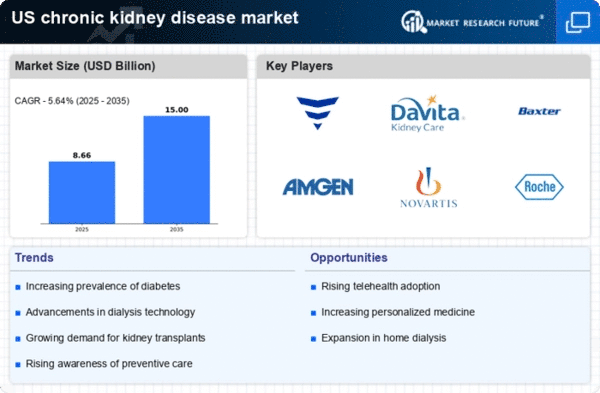Increasing Aging Population
The chronic kidney disease market is growing due to the increasing aging population in the United States. As individuals age, the risk of developing chronic kidney disease (CKD) escalates, with studies indicating that approximately 35% of adults aged 65 and older are affected by some form of CKD. This demographic shift is likely to drive demand for renal care services and treatment options, thereby expanding the chronic kidney-disease market. Furthermore, the aging population often presents comorbidities such as diabetes and hypertension, which are significant risk factors for CKD. Consequently, healthcare providers are focusing on early detection and management strategies to address the rising incidence of CKD among older adults, which may further stimulate market growth.
Policy and Regulatory Support
Policy and regulatory support for chronic kidney disease management is increasingly shaping the landscape of the chronic kidney-disease market. The U.S. government has implemented various initiatives aimed at improving kidney health, including the Advancing American Kidney Health initiative, which seeks to reduce the incidence of kidney failure and enhance patient care. Such policies are likely to encourage investment in kidney disease research and treatment options, thereby fostering market growth. Additionally, regulatory frameworks that promote the approval of new therapies and technologies may further stimulate innovation within the chronic kidney-disease market. This supportive environment could lead to improved patient access to care and better health outcomes.
Rising Healthcare Expenditure
Healthcare expenditure in the United States is on the rise, which appears to be a crucial driver for the chronic kidney-disease market. In recent years, healthcare spending has increased significantly, with estimates suggesting that it could reach $6 trillion by 2027. This surge in expenditure is likely to enhance access to advanced diagnostic tools and treatment modalities for CKD, including dialysis and kidney transplantation. Additionally, increased funding for research and development in nephrology may lead to innovative therapies, thereby expanding the chronic kidney-disease market. As healthcare systems allocate more resources to manage chronic conditions, the focus on CKD is expected to intensify, potentially improving patient outcomes and driving market growth.
Growing Awareness and Education
There is a notable increase in awareness and education regarding chronic kidney disease in the United States, which is positively influencing the chronic kidney-disease market. Public health campaigns and initiatives by organizations such as the National Kidney Foundation aim to educate the population about the risk factors and symptoms of CKD. This heightened awareness is likely to lead to earlier diagnosis and treatment, which could improve patient outcomes. Furthermore, as more individuals become informed about the importance of kidney health, there may be a corresponding increase in demand for screening and preventive measures. This trend suggests that the chronic kidney-disease market could benefit from a more proactive approach to kidney health management.
Technological Innovations in Diagnostics
Technological innovations in diagnostics are emerging as a significant driver for the chronic kidney-disease market. Advances in biomarker discovery and imaging techniques are enabling earlier and more accurate detection of CKD. For instance, the development of point-of-care testing devices allows for rapid assessment of kidney function, which may facilitate timely intervention. Moreover, the integration of artificial intelligence in diagnostic processes is likely to enhance the accuracy of CKD assessments. As these technologies become more accessible, healthcare providers may be better equipped to manage CKD, potentially leading to an expansion of the chronic kidney-disease market. The ongoing research and development in this area suggest a promising future for diagnostic advancements.

















